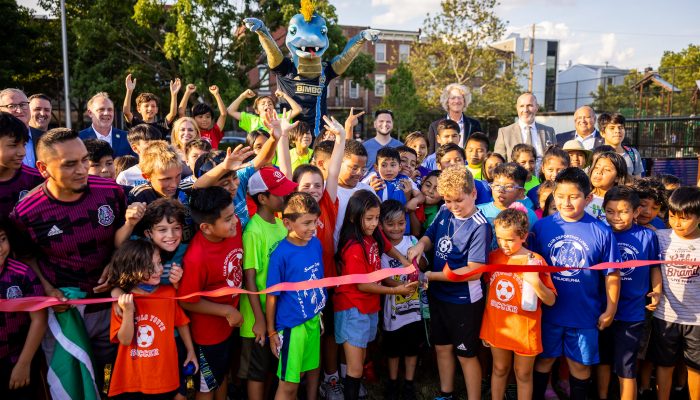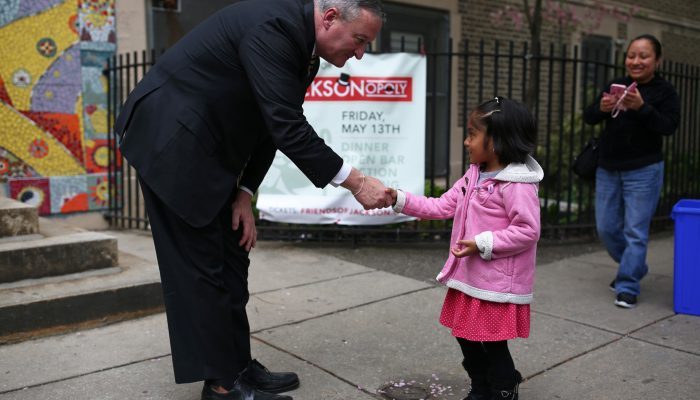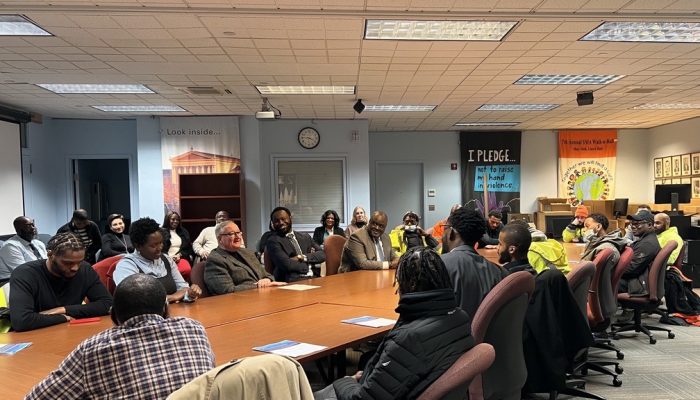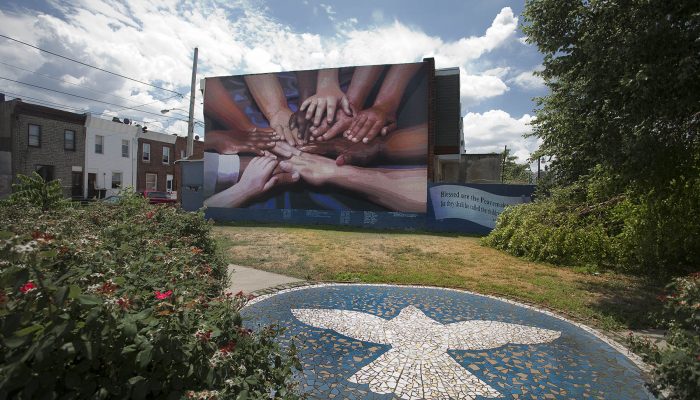Philadelphians deserve communities that make them proud. A key pillar of the Kenney administration has been to enhance the quality of life across Philadelphia by making safe, clean streets and neighborhood assets like parks, recreation centers, and libraries a reality for all Philadelphians.
During the last eight years, the Kenney administration has made extraordinary strides toward ensuring every community has the opportunity to thrive. Highlights of progress since 2016 include:
- Rebuild, a historic investment made possible by the Philadelphia Beverage Tax, is a $500+ million capital program for neighborhood parks, recreation centers, playgrounds, and libraries. It is the first program of its kind in Philadelphia with $390 million in contracted or expended funds.
- To date, Rebuild is on track to complete all 72 City Council-approved Rebuild sites, with 17 sites completed, another 20 sites preparing for or under construction, 39 sites with a “first fix” completed or underway, and 16 sites in the engagement and design phase.
- The program has achieved 57.2 percent participation for women and minority-owned contracts, with 165 Philadelphia minority-owned businesses who have participated in Rebuild’s diverse business support programs.
- The City launched its first-ever Opioid Response Unit (ORU) in 2020 to ensure a coordinated, data-informed response to the overdose epidemic.
- The ORU oversaw the investment plan for $20 million in initial national distributors opioid settlement payments, with a $7.5 million investment in the Kensington community-driven master planning effort and a $3.5 million grant commitment to community-based nonprofit partners through the Overdose Prevention and Community Healing Fund and Kensington Community Resilience Fund leveraging Community Granting Groups to select grantees.
- The Mechanical Street Cleaning Program has expanded to serve 14 Philadelphia neighborhoods since its launch in 2019. The initiative, which aims to revive robust, citywide street-sweeping efforts, is slated to include six additional neighborhoods in 2024.
- The Office of Arts, Culture and the Creative Economy (OACCE) has made unmatched progress in diversifying and expanding the City’s public art collection by commissioning and supporting public artworks that prominently celebrate the accomplishments and honor women and individuals who are Black, Indigenous, and People of Color (BIPOC), including the permanent statue of Harriet Tubman to be installed on the northeast apron of City Hall. OACCE also significantly increased access to safe, free, all-ages arts programming through the Neighborhood Arts Program; aided the arts community through the COVID-19 pandemic by providing funding through the COVID-19 Arts Aid PHL Fund and the Illuminate the Arts Grant program, which is still ongoing; and curated exhibitions celebrating the contributions of diverse Philadelphians throughout history and in the present day through its Art in City Hall exhibits program.
Rebuild
Philadelphia has more than 400 neighborhood parks, recreation centers, and libraries. They serve as safe havens for people to learn, play, exercise, and get access to important services that build stronger futures and more vibrant communities. After decades of deferred maintenance and disinvestment, a staggering 90 percent of these critical community spaces needed investment at the beginning of the Kenney administration.
In 2016, the Kenney administration tackled this crisis head-on with the passage of the landmark Philadelphia Beverage Tax, which funds Philadelphia’s Rebuilding Community Infrastructure Initiative, known as Rebuild, PHLpreK, and Community Schools.
Passed with overwhelming support by City Council in 2017, Rebuild is a historic investment in our City’s public spaces that makes communities stronger, safer, and more vibrant. The program is a data-driven and strategic approach to community investment that directs resources to where they will have the greatest impact while ensuring minority and women-owned businesses play a major role in the effort.
Today, Rebuild has become a national model for public-private infrastructure investments with an unprecedented $500 million in public and private funds to improve 72 parks, libraries, and recreation centers in neighborhoods all across the city. The program is exceeding its diverse contracting goals, with 57.2 percent of committed contract dollars going to diverse firms, 165 businesses that have participated in Rebuild’s diverse business support programs, and 94 women and minority graduates of workforce development programming designed to create access to living wage jobs in the construction sector.
The public-private effort is supported by a $100 million funding commitment from the William Penn Foundation, the single largest grant in Foundation history and one of the largest private investments in public space in the country.
Spaces Where People Thrive
Rebuild is in high gear, with all 72 approved sites on track for completion. These investments are changing the fabric of our communities for the better, providing intergenerational spaces for gathering, playing, and learning. Some highlights from 2023 alone include:
- Cutting the ribbon on Fotterall Square Park in North Philadelphia, which provided much-needed site improvements for the community including a new playground, a basketball court, and a soccer mini-pitch as part of the Rebuild’s partnership with the Philadelphia Union Foundation and Eastern PA Youth Soccer to build 15 mini pitches across Philadelphia,
- Starting construction at Ziehler Playground, a $7 million investment in the Olney community with updates focused on providing a safe place for educational and after-school activities for children and families.
- Celebrating the completion of Glavin Recreation Center and Playground in Port Richmond which is now the home of a new mini-pitch in partnership with the Philadelphia Union Foundation and Eastern PA Youth Soccer.
- Breaking ground at Kingsessing Library, which is one of 12 Rebuild Free Library sites set to receive over $7 million in improvements. Rebuild also broke ground on Kingsessing Recreation Center, a century-old building that will receive a $25 million makeover that will include a new playground, accessibility upgrades, new plumbing, electric and interior renovations, and a new artificial turf athletic field funded by the NFL Foundation and the Philadelphia Eagles.
- Celebrating the groundbreaking of Francis J. Myers Recreation Center in Southwest Philadelphia, a $20 million investment for the community, among many more.
Engagement and Design
Community involvement is central to Rebuild’s mission to make improvements to community gathering spaces that are informed by residents’ knowledge, power, and expertise. Rebuild’s community engagement and design processes run concurrently to ensure that feedback from community members shapes the final design of each renovation.
Rebuild uses individual stakeholder interviews, small group stakeholder meetings, large in-person and virtual public community meetings, surveys, school visits, and interactive workshops as tools to incorporate community feedback into every step of the design process. The community engagement plans prioritize language and accessibility needs while building trust and engaging with youth and families.
Supporting Diverse Businesses
Rebuild generates social returns that multiply beyond transformed public spaces, pioneering diverse business support programs and workforce opportunities to ensure the impact of the Rebuild dollar goes beyond just physical improvements.
Launched in 2019, Rebuild’s diverse business support includes the Rebuild Ready Small Business Support Program and the Emerging Vendors Program (EVP). EVP assists minority and women-owned businesses with obtaining their Minority Business Enterprise (MBE) or Women Business Enterprise (WBE) certification. Since the inception of EVP, 35 vendors have obtained their MBE or WBE certification and 31 vendors joined the City of Philadelphia’s Office of Economic Opportunity Registry.
One hundred participants have enrolled in the Rebuild Ready Program. Vendors graduate with the knowledge to bid on Rebuild and other public works projects. The program also provides mentoring to current participants and past graduates, ranging from blueprint reading, assistance with bonding and insurance, back office support, and more.
POTENTIAL VISUAL: Minority representation bar graphs on page 5 of the Rebuild September Progress Report
Launch of Opioid Response Unit
The Opioid Response Unit (ORU) coordinates Philadelphia’s efforts to implement citywide opioid response strategies, target interventions where overdoses happen the most, and align City resources across various departments.
Launched in 2020 as a permanent expansion of the two-year Philadelphia Resilience Project, the ORU aims to save lives, rejuvenate communities most impacted by the ongoing opioid crisis, and reduce racial disparities in overdose rates. The ORU has created a direct line of communication between the Kensington-area community leaders and the administration, ensuring community voice and priorities remain central and leaders are engaged, informed, and consulted. In addition to serving as a connecting body for interagency-related overdose planning and intervention, since its inception, the Opioid Response Unit has led and partnered on multiple funding and outreach initiatives:
- Through a partnership with the City’s Office of Community Engagement and Opportunity (CEO), the ORU initiated a robust door-to-door canvassing campaign in 2023 to reach 100,000 households to distribute substance use treatment information, naloxone, and fentanyl test strips to residents in their homes. Since October 2023, the CEO canvassers have knocked on over 22,000 doors, distributed over 6,000 doses of naloxone and 4,500 sets of fentanyl test strips, and trained approximately 50 Trusted Community Messengers to share resources and spur community engagement around overdose prevention.
- The ORU has successfully facilitated the distribution and spending of the first installments of the national opioid settlement, equalling approximately $20 million. In total, the City expects to receive approximately $200 million in Opioid Settlement Funds over 18 years.
- In 2022, the ORU, in partnership with the Scattergood Foundation, initiated the Overdose Prevention and Community Healing Fund to redistribute $3.1 million in Opioid Settlement Funds to community-based organizations. To date, the City has awarded $1.9 million in grants to 27 non-profits working directly with impacted residents and recently launched the second round of the Fund (grantees to be announced in Spring 2024).
As a result of these and other actions, the City has made significant investments aimed at on-the-ground overdose prevention, family and community healing, and substance use prevention, including:
- $100,000 one-time grants to six Kensington-area parks. Importantly, planning for spending each $100,000 grant will be led by friends groups, community organizations, and civic associations.
- $2,000,000 to divide among six Kensington-area schools to support school-specific priorities.
- Expansion of housing opportunities to assist community members experiencing homelessness and substance abuse disorders, including additional low-barrier, couples-based, and permanent supportive housing slots.
- Increasing home repair grant programs for homeowners in zip codes most impacted by the overdose crisis.
- Launching the first licensed mobile wound care units in Pennsylvania. The wound care units have proven an essential tool in the overdose crisis, as xylazine-related overdose numbers continue to rise. Xylazine, a non-opioid sedative, can cause necrotic wounds that require ongoing, professional medical care, in addition to acting as an additional barrier to substance use disorder treatment.
- Development of an ongoing weekly Kensington Wellness Resource Fair, where people who may be experiencing homelessness or are in need of substance-use and adjacent services can access real-time resources including, but not limited to, housing assessments and access to shelter, access to substance-use disorder treatment, wound care, COVID-19 testing and vaccination, HIV and Hepatitis B testing and related case management.
Clean Streets
In Spring 2023, the City embarked on Phase 3 of its Mechanical Street Cleaning Program. Now in its fourth year, the initiative aims to revive robust, citywide street-sweeping efforts by targeting vulnerable communities with high concentrations of trash and debris. In addition to removing litter, street cleaning prevents trash and debris from entering the City’s water system, and sanitation officers are authorized to issue code violations for illegal litter and dumping.
The program expanded to include service in 14 new neighborhoods from April to November of 2023 and will expand to include six additional neighborhoods in 2024. The program, funded by $62 million committed over five years by the Kenney administration in 2021, aims to implement citywide residential street cleaning in the coming years.
Community Life Improvement Program
The City continues to partner with residents, community groups, and businesses to make Philadelphia a cleaner, safer place to live. The Community Life Improvement Program’s (CLIP) focus on clearing vacant lots and removing graffiti from buildings, signs, and street fixtures continues to pay dividends beyond just improving the aesthetics of neighborhoods.
A recent study from the University of Pennsylvania and Columbia University found that beautification efforts could be linked to a drop in gun crime, and the City continues to improve its response to resident requests through Philly311.
Among other improvements, CLIP’s efforts have allowed the City to:
- Remove vandalism from buildings, street signs, and other fixtures.
- Paint vacant boarded-up properties to resemble doors and windows.
- Enforce Philadelphia’s regulations to keep the exteriors of properties and vacant lots clean.
- Lend supplies and offer trash pickup for CLIP-coordinated neighborhood cleanups.
- Offer adult non-violent offenders the opportunity to complete their community service sentences by cleaning and beautifying the city.
- Provide employment opportunities to those formerly in the Criminal Justice System.
- Increase employment for those who are experiencing homelessness, a substance use disorder, or other barriers to employment by partnering with Philadelphia Works Incorporated and the Same Day Pay Program.
Vision Zero
Mayor Kenney believes that even one death or serious injury due to traffic violence is an unacceptable tragedy with a lasting impact on families and entire communities. Over the past eight years, the administration has worked tirelessly to improve traffic safety on all City streets.
Despite a dramatic decline at the onset of the COVID-19 pandemic in 2020, fatal crashes in Philadelphia continue to exceed pre-pandemic levels. Eighty percent of all traffic deaths or serious injuries occur on just 12 percent of City streets. What’s more, underserved populations disproportionately experience the impacts of dangerous streets, with fatal or serious injury crashes three times more likely to occur in low-income areas of the city.
In 2016, Mayor Kenney signed an executive order that adopted Vision Zero and created the Office of Complete Streets. Vision Zero’s goal is to eliminate traffic deaths and serious injuries on Philadelphia streets by 2030. Vision Zero and the Office of Complete Streets guide how the City designs its streets and traffic safety programs.
In January 2022, the U.S. Department of Transportation released the National Roadway Safety Strategy. This strategy is the first national Vision Zero-style approach to eliminate roadway fatalities. Federal policy now aligns with Philadelphia’s Vision Zero program.
Highlights of the City’s progress since 2016 include:
- Securing $220 million in federal, state, and local traffic safety grants over the past year.
- An overall 34 percent reduction in crashes resulting in fatal or serious injury, and 20 percent fewer crashes of any severity, on corridors that have received complete street treatments, compared to High Injury Network trends.
- Roosevelt Boulevard’s automated speed safety cameras have led to a 95 percent decrease in speeding violations and 21 percent fewer fatal and serious injury crashes.
- More than doubling the number of trips in separated bike lanes.
- Six Neighborhood Slow Zones have been installed, or are currently in a design process, with a system of traffic calming throughout a community.
- Safe Routes Philly, the City’s youth bicycle and pedestrian safety education program, continues to enhance traffic safety culture. Safe Routes Philly has a K-5 curriculum, with middle school under development, and a Youth Ambassador Program launching in 2024.
Arts and Culture
Home to the oldest and largest collection of public art in the United States, Philadelphia is a steward to more than 1,000 murals, statues, and sculptures located in civic and public spaces. These incredible works of art reflect the many vibrant communities that shape our city and help to define the identity of Philadelphians.
To that end, the Kenney administration redoubled its commitment to the Office of Arts, Culture and Creative Economy (OACCE), which aims to increase access to the arts by equitably supporting culture and creativity in our neighborhoods. OACCE continues to oversee some of Philadelphia’s most important public art installations and ensures the city’s public art collection is a true reflection of the many vibrant communities and cultures that shape Philadelphia.
Under the Kenney administration, the number of permanent public art installations added to the City’s public art collection that are created by or celebrate women and Black, Indigenous, and People of Color (BIPOC) stories has been unprecedented. OACCE has also increased access and equitable support of arts and culture by providing free cultural experiences in Philadelphia’s most underserved communities, offering communities safe spaces to gather and share cultural experiences; curating temporary and permanent exhibits that celebrate and honor historic and contemporary stories about Philadelphians; and providing ongoing financial support to artists and arts organizations still recovering from the impact of the COVID-19 pandemic.
Some of OACCE’s most notable projects include:
- Adding more permanent public artworks created by or celebrating women and BIPOC stories to the City’s public art collection than any previous administration. Since 2016, the City of Philadelphia has financed, initiated, or completed 38 permanent public art projects that are created by or celebrate women and BIPOC stories, starting with the Octavius V. Catto Memorial installed on the southwest apron of City Hall in 2017. Other notable projects include commissioning a permanent statue of Harriet Tubman, the City’s first statue of a Black female historical figure, to be located on the northeast apron of City Hall; commissioning “Her Luxuriant Soil,” a memorial to celebrate the lives of more than 5,000 African Americans buried at the historic Bethel Burying Ground, to be located at Weccacoe Playground in Queen Village; “MVP,” a statue of a young Black female basketball player at Smith Playground; a statue of Blanche A. Nixon, a Black community activist, to be located the Blanche A. Nixon library; “El Ritmo Del Centro,” a mosaic and mural celebrating the predominantly Hispanic neighborhood of Fairhill, located at the Mann Rivera Recreation Center; and a Marian Anderson statue, celebrating the life and legacy of this civil rights activist and world-renowned opera singer, to be located in front of the Academy of Music on South Broad Street; to name a few.
- Winning a $1 million Bloomberg Public Art Challenge grant for public art addressing the issue of gun violence. Philadelphia’s project, “Healing Verse Germantown: The Streets are Talking” (HVG), will help approximately 200 Germantown community members translate their experiences with gun violence into poetry which will be used to create approximately 20 public art installations in the neighborhood of Germantown.
- Providing relief to individual artists and arts organizations after unprecedented revenue loss due to the COVID-19 pandemic. OACCE aided in the recovery of Philadelphia’s arts and culture community from the impact and loss of revenue during the COVID-19 pandemic by partnering with the Greater Philadelphia Cultural Alliance and Philadelphia Cultural Fund to create the COVID-19 Arts Aid PHL Fund, and by launching the ongoing Illuminate the Arts Grant (ITAG) program. The COVID-19 Arts Aid PHL Fund awarded $4 million to 466 arts and culture organizations and 977 individual artists. ITAG awarded $2.5 million to 128 small arts and culture organizations and 1,451 individual artists.
- Supporting nearly 700 free family-friendly arts activities through the Neighborhood Arts Program (NAP). Since January 2016, OACCE has supported approximately 700 free arts programs throughout Philadelphia’s neighborhoods — including theatrical and musical performances, film screenings, dance instruction, children’s art-making workshops, and much more, attracting over 200,000 estimated attendees. Fifty-four percent of NAP events have been in Philadelphia’s 24 poorest neighborhoods since 2021.
- Providing almost $6 million in funding to 7,688 Philadelphia-based individual artists and arts organizations. Since 2016, OACCE has paid $5,844,737 to hire artists and arts organizations to provide cultural experiences in communities, pay artists and arts organizations to compete for public art commissions and create permanent public artworks, and fund individual artists and small arts organizations through grants. Since 2016, 47 percent of artists funded through OACCE’s Public Art program were BIPOC artists and 52 percent were women. Since 2019, 61.2 percent of individual artists funded through OACCE’s ITAG and NAP programs were BIPOC artists and 45.5 percent are women.
- Showcasing exhibits that mark historic and impactful events in Philadelphia. Since 2016, OACCE has organized over 100 exhibits that attracted nearly 400,000 estimated visitors, including “Remembering MOVE: May 13, 1985,” a permanent educational exhibit about the 1985 MOVE bombing installed in the City’s Municipal Services Building; a permanent exhibit honoring the Reverend Dr. Leon H. Sullivan for his 100th birthday at the Philadelphia International Airport; and “An Introduction Timeline for the Life of Harriet Tubman” and “Dreams of Freedom: The Threads that Hold us Together,” temporary exhibits at City Hall including celebrating Harriet Tubman’s 200th birthday and the significant role Philadelphia played in her story.
Maintaining Our Momentum
Over the past eight years, Philadelphia has been committed to improving the quality of life for all by improving City parks, libraries, and neighborhoods, but there is still more work to be done, including:
- Continuing to champion Rebuild: While Rebuild continues to make a significant impact on our communities, it will be up to the next administration to see through projects that are already underway and secure additional resources for future investment. We strongly encourage the next administration to continue and build upon the program that has already touched the lives of so many Philadelphians.
- Raising additional funds to meet community needs: Despite its success, Rebuild alone will not be able to meet the City’s needs after so many decades of neglect. Rebuild’s fundamental mission is to make sites safe, clean, and ready to use, but that is just the baseline for many communities. Additional, significant investments from both public and private sectors, along with engagement from individual communities, will be needed to continue to fuel infrastructure improvements to reach every community that so desperately needs them.
- Implementing uniform strategies for overcoming the overdose crisis: The city’s recovery demands a coordinated response across the whole of government, as well as sustained partnerships with community-based organizations working to improve the health, housing, and opportunities of those most impacted by the overdose crisis.
- Cleaner neighborhoods, safer streets: Creating more beautiful, vibrant communities has ripple effects that can improve the quality of life for all Philadelphians. By continuing to invest in programs like CLIP and Mechanical Street Cleaning, while making continued investments to repair our streets and remove abandoned vehicles, we will ensure that Philadelphia is a desirable place to live and work.
- Recommitting to Vision Zero: The goal of eliminating all traffic violence throughout the city is vital to our health and safety as Philadelphians. We strongly urge the incoming administration to embrace the principles of Vision Zero and continue the fight to enact holistic solutions that make our city a better place to live.
- Fostering creative communities through art and culture: Philadelphia’s commitment to the arts reflects the City’s history, identity, and values. Philadelphia must be a strong steward of the public works under its watch while continuing to promote creativity and artistic expression in our communities.




